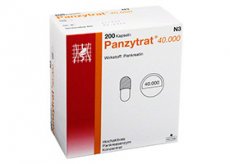Medical expert of the article
New publications
Preparations
Pancitrate
Last reviewed: 03.07.2025

All iLive content is medically reviewed or fact checked to ensure as much factual accuracy as possible.
We have strict sourcing guidelines and only link to reputable media sites, academic research institutions and, whenever possible, medically peer reviewed studies. Note that the numbers in parentheses ([1], [2], etc.) are clickable links to these studies.
If you feel that any of our content is inaccurate, out-of-date, or otherwise questionable, please select it and press Ctrl + Enter.

Pancitrate helps to replenish the lack of pancreatic enzymes.
Indications Panzitrate
It is used in the following situations:
- for replacement therapy in chronic pancreatitis, dyspepsia, gastrocardial syndrome, cystic fibrosis, pancreatectomy, non-infectious diarrhea and bloating, and also after radiation procedures;
- in case of disorders of the processes of assimilation of food products after a resection procedure in the stomach area or any part of the small intestine;
- to improve the digestive process in case of poor nutrition, sedentary lifestyle, problems with chewing activity or after being in a state of prolonged immobility.
In addition, Pancitrate is used during instrumental examination procedures of the abdominal organs (X-ray or ultrasound).
Release form
The product is released in gelatin capsules placed in polyethylene or glass bottles. Each bottle may contain 20, 50 or 100 capsules.
Pharmacodynamics
The medicine helps to compensate for pancreatic activity, which is characterized by a deficit in secretion production. The drug has a proteolytic, lipolytic, and amylolytic effect. The effect of pancreatin enzymes leads to the breakdown of proteins, which are converted into amino acids; starch, which is converted into dextrins with monosaccharides; and fats, which are broken down into glycerol with fatty acids.
Pancitrate stabilizes all digestive processes and helps improve the functioning of the gastrointestinal tract. Pancreatic enzymes are released from capsules inside the small intestine, entering an alkaline environment. The capsules' stable shell helps them avoid dissolution under the influence of gastric juice.
Pharmacokinetics
Once inside the stomach, the capsules are then mixed with the food consumed, after which they are evenly distributed within the acidic environment of the stomach. During gastric passage, the acid-resistant shell of the capsules prevents the possibility of inactivation of pancreatic enzymes.
Once the capsules move with the food into the small intestine, they dissolve under the influence of the alkaline environment, after which the enzymes begin to be released.
Dosing and administration
The medicine is taken orally, with or after food. The capsule should not be chewed, it should be swallowed and washed down with some liquid (plain water, fruit juice or warm tea). The portion size is determined by the severity of the digestive disorder. The average adult dose is 1-2 capsules of 10 thousand units or 1 capsule of 25 thousand units. They should be taken three times a day.
The duration of the course is prescribed for each person individually, taking into account the medicinal indications (for 3-5 days if there are errors in the dietary regimen, or for 3-12+ months if the patient requires constant replacement therapy).
 [ 3 ]
[ 3 ]
Use Panzitrate during pregnancy
Because clinical testing of the effects of pancreatic enzymes on pregnant women has not been conducted, Pancitrate should be prescribed with caution during this period. There is also insufficient data from animal testing to study the toxic effects of the substance on reproductive function and fertility.
Since there is no information on the systemic exposure of pancreatic enzymes, the possibility of drug exposure to a breast-feeding infant should not be expected. Therefore, the drug is allowed to be used during lactation.
If necessary, nursing or pregnant women can consume pancreatin in portions that provide the required nutritional status.
Contraindications
Main contraindications:
- acute pancreatitis or chronic pancreatitis during an exacerbation;
- hypersensitivity to the components of the drug;
- children under 6 years of age.
Side effects Panzitrate
Pancitrate is generally tolerated without complications. Only occasionally do allergy symptoms, nausea, discomfort in the stomach, and diarrhea or constipation develop. As a result of prolonged intoxication, hyperuricosuria or hyperuricemia may develop. In cystic fibrosis, due to exceeding the recommended dose, a stricture may appear inside the ascending colon.
Overdose
Intoxication with the drug may cause hyperuricosuria, hyperuricemia, or constipation.
Interactions with other drugs
The combination of Pancitrate with antacids containing calcium carbonate or magnesium hydroxide weakens the effectiveness of the substance pancreatin.
The use of drugs can reduce the absorption of iron, as well as folic acid.
 [ 4 ]
[ 4 ]
Storage conditions
Pancitrate should be kept in normal conditions for medicines. Temperature values should not exceed 20°C.
 [ 5 ]
[ 5 ]
Special instructions
Reviews
Pancitrate receives mostly positive reviews. It works great after heavy feasts (for example, during the holidays), helping to eliminate disorders associated with the digestion of food products and facilitating this process. The drug is also often prescribed for the treatment of chronic pancreatitis.
Shelf life
Pancitrate can be used for 3 years from the date of release of the drug.
Attention!
To simplify the perception of information, this instruction for use of the drug "Pancitrate" translated and presented in a special form on the basis of the official instructions for medical use of the drug. Before use read the annotation that came directly to medicines.
Description provided for informational purposes and is not a guide to self-healing. The need for this drug, the purpose of the treatment regimen, methods and dose of the drug is determined solely by the attending physician. Self-medication is dangerous for your health.

